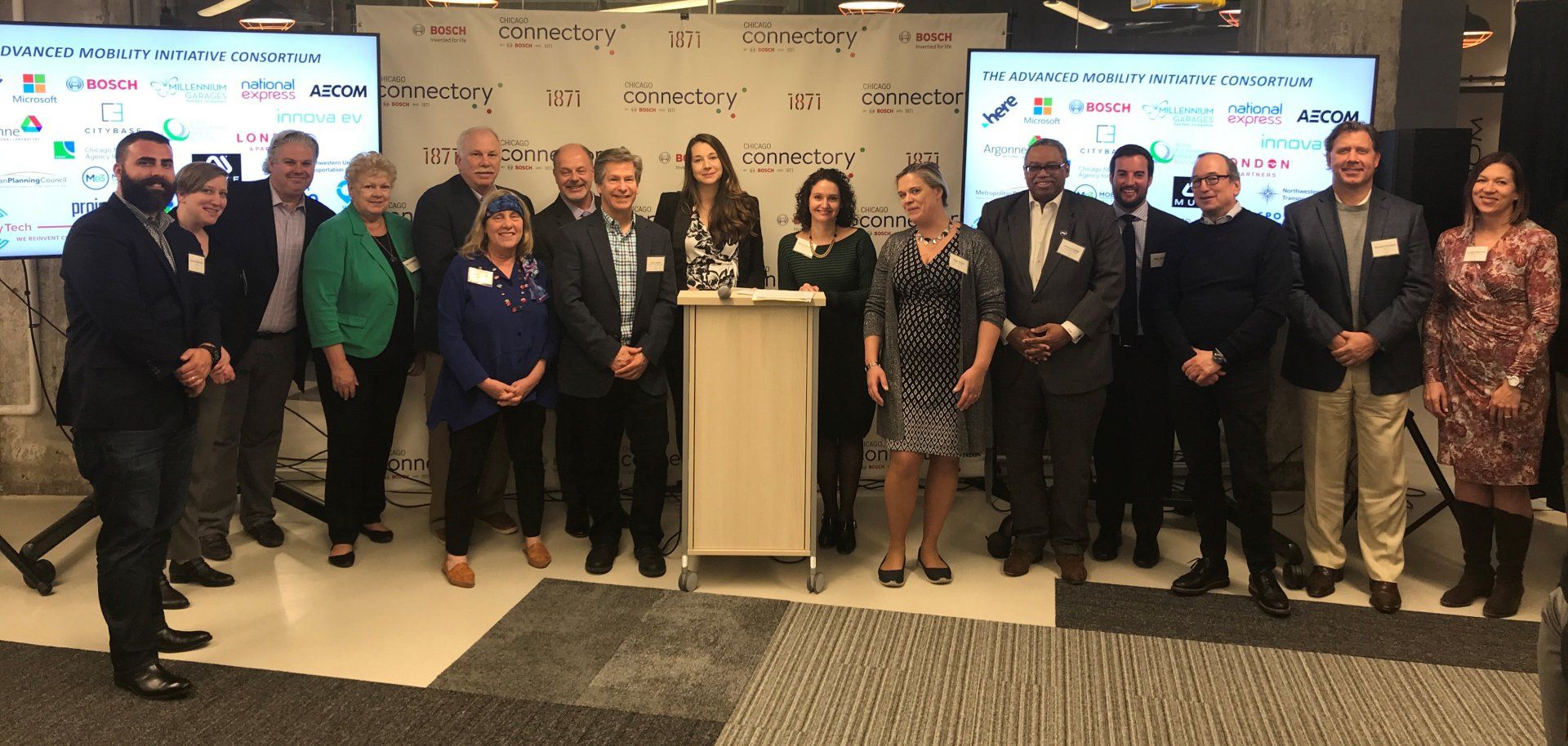New Plan Preps Chicago for Drones, Driverless Cars and Other Transit Tech
American Inno Highlights City Tech's Advanced Mobility Initiative.
In a world where pedestrians, public transit, Ubers, autonomous cars, electric scooters, drones and Amazon Prime trucks all may have to coexist one day, roadways could quickly become overcrowded. And if urban planners don’t prepare for multimodal transportation systems, we could all end up spending a lot more time commuting.
To help improve Chicago’s transportation system and prepare it for a tech-enabled future, local urban planning organization City Tech Collaborative
has released a comprehensive, three-year plan
designed to support urban mobility innovation in the Windy City.
The plan aims to expand public transit access, improve the efficiency of freight shipping and prepare streets for autonomous vehicles and drones, among other things, all while keeping safety, congestion and last-mile connectivity in mind, said City Tech CEO Brenna Berman.
According to a study from McKinsey & Co., if Chicago neglects changing mobility trends, residents can expect a 15 percent increase in congestion and a 16 percent increase in their commute times by 2030.
City Tech is working with several civic and business partners to execute the plan’s initiatives, ranging from the Chicago Transit Authority and Illinois Autonomous Vehicle Association, to HERE Technologies and Chicago logistics startup project44.
Berman was one of several civic and business leaders who served on former Chicago mayor Rahm Emanuel’s Mobility Task Force
last year. The task force aimed to help manage and prepare for an influx of new transportation methods, from ride-sharing and bike-sharing, to electric scooters and autonomous vehicles. In March, the task force
released a report
making recommendations for how the city should incorporate and regulate new forms of tech-enabled transportation.
One of those recommendations included hosting an
electric scooter pilot
this past summer. The pilot, which ended Tuesday, saw nearly 800,000 rides taken across 2,500 scooters from 10 vendors, according to data from the City of Chicago. In 2018, Chicago also operated a
dockless bike pilot,
but it is still unclear whether the bikes or electric scooters will ever become permanently available in the city.
“Through our work with that task force, it became clear that if the city didn’t have a plan for how to make the most of all of these technologies and novel innovations that are impacting the world from a mobility perspective, things weren’t necessarily going to go well in Chicago,” Berman said. “That began to refine our focus on how much a city like Chicago really needs a comprehensive mobility innovation plan.”
Though City Tech’s plan addresses a number of transportation methods, Berman said it will be heavily focused on how to improve Chicago’s public transportation system, mainly because of the large and diverse population that depends on it.
“Public transit really is the only mode in any city that is required to support all travelers,” Berman said. “No one else actually has that requirement and it’s incredibly important that you find the most effective and efficient way to meet that mission.”
City Tech will work with the CTA to improve train and bus efficiency, reliability and user experience, as well as add more first-mile and last-mile connectivity in areas that aren’t well-connected to train and bus stops.
Electric mobility innovation and climate impact will also be a priority for City Tech as society shifts away from the use of fossil fuels to power vehicles. Part of that will include developing robust and accessible charging infrastructure for electric vehicles.
To address autonomous vehicles and drones, the organization plans to help facilitate pilots to test for safety and infrastructure readiness. Last year, Illinois
launched an autonomous vehicle pilot
after being slow
to embrace the new form of transportation.
Over the next three years that City Tech works on its plan, Berman said one of its first initiatives is to tackle traffic congestion to foster shorter commutes.
City Tech partner data shows that in 2018, the average commute for Chicagoans was 38 minutes, with more than 1 million residents spending more than 40 minutes commuting to work each day. Additionally, nearly 50 percent of Chicago commuters drove to work alone each day and more than 266,000 ride-share trips were taken every day.
To tackle congestion specifically, new local startup SpaceBot SURGE is developing sensors that could facilitate the first congestion pricing system
in Chicago.
Other goals of City Tech’s plan include improving ride-share pick up and drop off locations to minimize curbside congestion, deploying drone infrastructure and improving supply chain efficiency for freight vehicles. Though City Tech’s plan is specifically designed for Chicago, Berman said it could be used as a blueprint for improving transportation in many other cities as well.
“We really want to have an impact on mobility challenges generally,” Berman said. “That means bringing an awful lot of data together to reduce the friction between modes of transportation, and create shared data standards and management infrastructure.”
Read the article at American Inno.
Story was also featured in the Chicago Business Journal.
